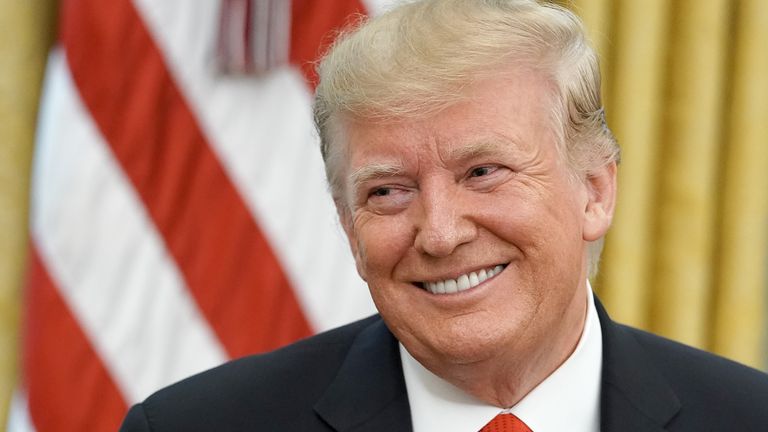Afghanistan: Temporary end to talks as US and Taliban don't want to fight forever
Taliban leaders may be claiming to be ready to wage war for 100 years - but their country is tired of the death and economic cost.
Monday 9 September 2019 17:52, UK
The sudden termination by President Donald Trump of peace talks between the United States and the Taliban will only be temporary as neither side wants to fight forever.
Taliban leaders may be claiming to be ready to wage war for one hundred years but their country is tired of the insecurity, tired of the death and tired of the economic cost.
The US-backed Afghan government - sidelined from the US-Taliban negotiations - also wants a sustainable peace as do Washington, London and the rest of the NATO alliance.
Efforts over the past year by the Trump administration and the Taliban to come to an agreement to end 18 years of bloodshed offered the first real hope of an end to the conflict.
Peace requires talking to and compromising with the enemy.
But President Trump's apparent desire to pull American troops out of Afghanistan ahead of the US presidential election next year added an artificial clock to the proceedings, which weakened the US hand and played to the strength of the Taliban, which is in no such hurry.
Barack Obama as president made the same mistake along with then prime minister David Cameron in 2012 when the two men set a deadline of the end of 2014 for the completion of NATO combat operations in Afghanistan and the withdrawal of combat forces.
It meant the Taliban could sit and wait for the foreign forces to leave before turning back up the violence and reclaiming control over swathes of territory. They will always be able to outstay any invading force.
So President Trump was right to halt what could have been a historic moment in the peace process on Sunday, with Taliban leaders as well as Afghan President Ashraf Ghani invited to the presidential retreat of Camp David for talks, even if it means delaying the US troop exit.
Final negotiations between the two sides had been taking part against a growing wave of deadly Taliban violence in recent weeks.
The last straw, according to President Trump, had been a car bomb in Kabul on Thursday that killed 12 people, including a US soldier.
Taliban leaders, however, told The Times that they had already turned down the invitation to attend the Camp David meeting amid various disagreements.
"We were invited to Camp David but refused to go," a senior Taliban source was quoted as saying. "The US wanted us to announce a nationwide ceasefire but again we refused. It is not possible for us.
"We will fight. We have fought for 18 years and we will fight for a hundred years. We will continue our jihad. They will have to pay a price."
Zalmay Khalilzad, the US envoy for Afghanistan, has been recalled to Washington to work out the next steps. He has led the US side of negotiations and only last week travelled to Kabul to announce an agreement with the Taliban had been reached in principle.
Emotions about the conflict in Afghanistan will be running particularly high this week as the United States marks the 18th anniversary of the 11 September attacks launched by al Qaeda from Afghanistan, where they had been allowed a safe-haven under the Taliban.
Increased Taliban violence can be expected on the streets of Kabul and elsewhere in the country - which will be met by more security operations by US-backed Afghan security forces - especially in the run-up to Afghan elections still planned for 28 September.
But the suspended talks can be switched back on just as quickly as they were terminated, which both sides will be seeking to do in private regardless of what they say and do publicly.






